Kalil Bottling evolves portfolio, operations
Bottler balances CSDs and new age products to serve customers
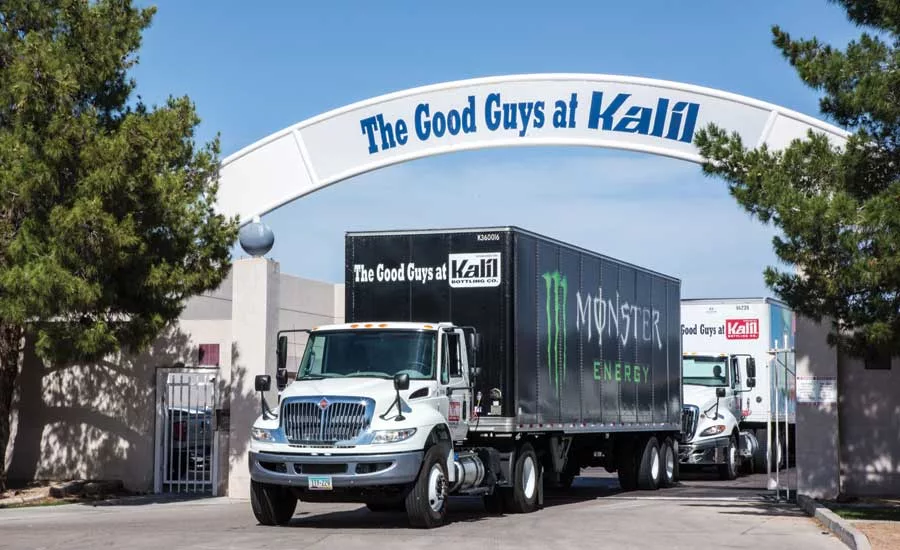
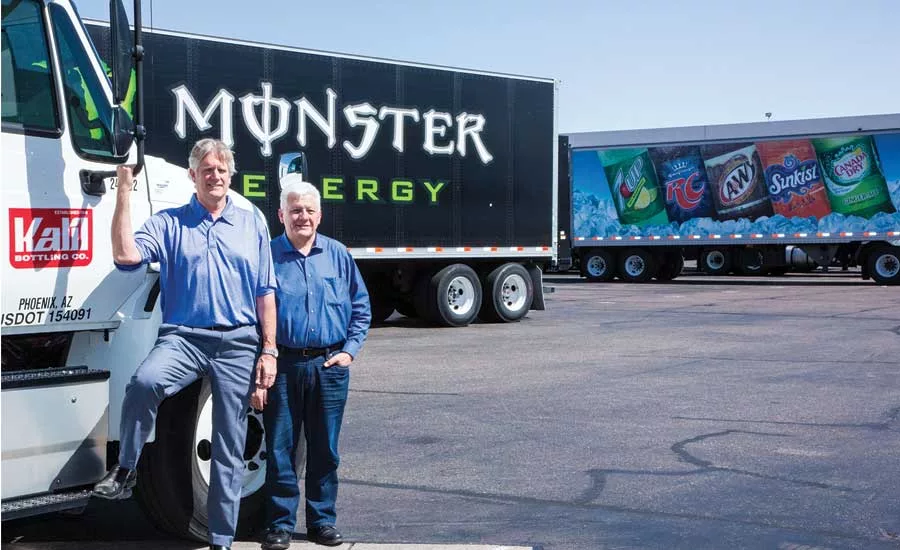
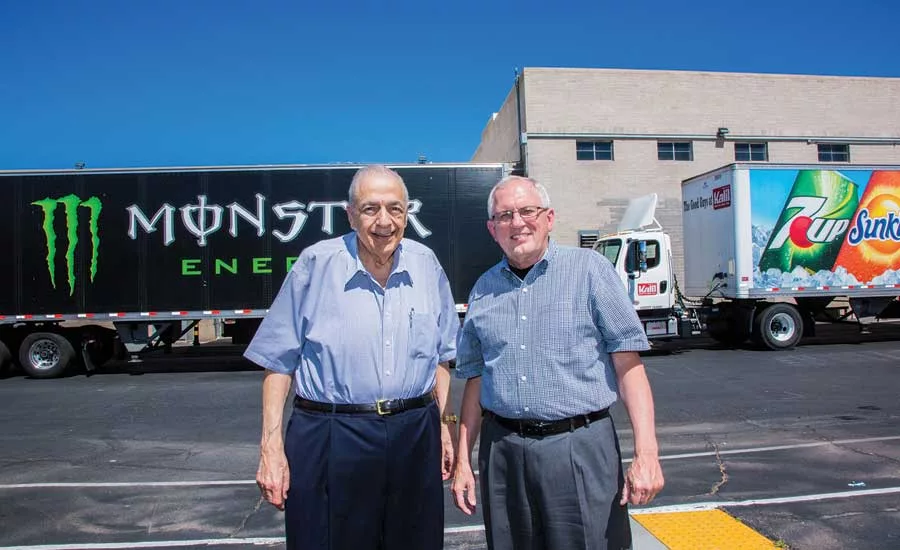
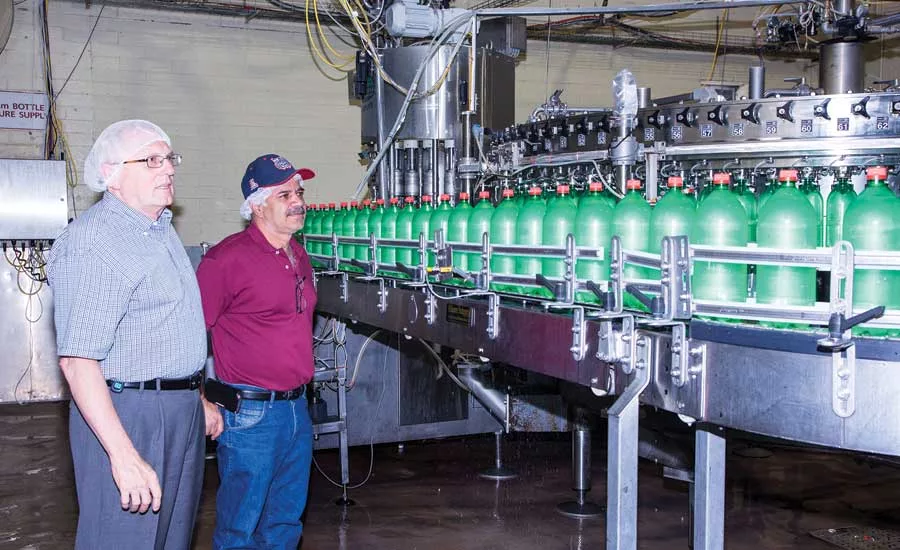
Randy Bright (left), chief financial officer and treasurer, and Hossain Monazzami, quality control manager, monitor Kalil Bottling’s single bottling machine at the only bottling facility in Tucson, Ariz. (Photo by Dean Farrell)
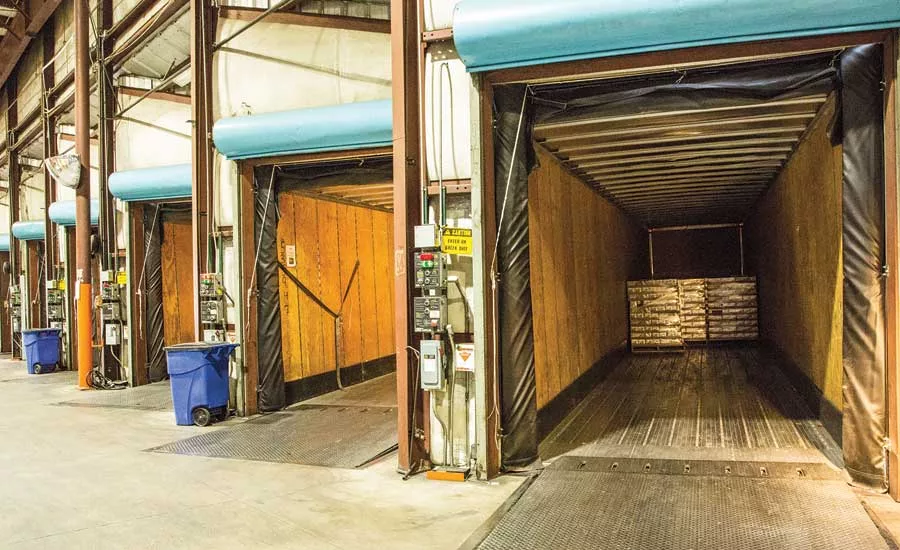
Kalil Bottling’s Phoenix facility is its largest distribution facility and now distributes in a day what was more than a month’s worth of business in 1975. (Photo by Dean Farrell)
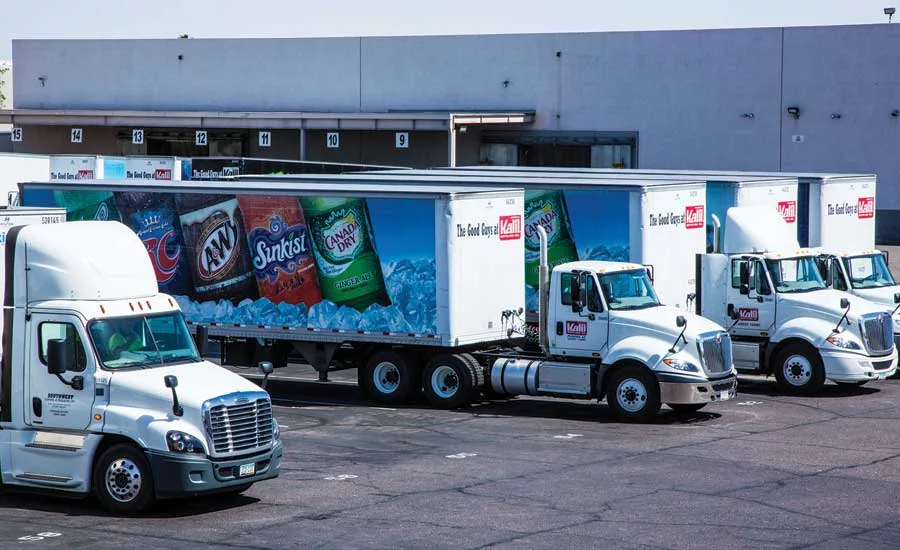
In 1948, Fred Kalil and his father opened the doors to Kalil Bottling Co. in Tucson, Ariz. The father-son team ran the company until it was handed down to Fred Kalil’s two sons, George and John, who now lead the bottling company and employ fourth-generation family members — making it not only a business, but a family tradition. Despite the many challenges that face a family-owned and -operated independent bottler, Kalil Bottling Co. demonstrates continued success because of its strong team and ever-evolving portfolio of products.
George Kalil was just 10 years old when he started his first job at the family business, spending every Saturday and his summers at the Kalil Bottling facility sweeping, organizing bottles and filling the bottle-washing machine. As a high school sophomore, he began working full-time delivering carbon-dioxide cylinders. Then, in 1970, he assumed the role as president, and under his leadership, the company’s net sales have grown from $400,000 to more than $190 million, he says.
“Early on, we focused on adding territories and brands,” George Kalil explains. “More recently, we have added new beverage types and other services (like trucking) that extend our reach. A Pepsi bottler once described Kalil as the greatest story never told; for many years, many believed we would not make it. Although we have had some challenging times, we are still here and are getting stronger every year.”
His brother John took on the role of vice president in 1981, and also has worked in the family business for decades. In July 1975, he relocated from Tucson to Phoenix, where he manages the company’s largest distribution facility. According to the company, the Phoenix facility now distributes in a day what was more than a month’s worth of business in 1975 in the “Valley of the Sun.”
Kalil Bottling’s history not only is rich in family tradition, but also in its ability to implement innovation. The company has evolved its portfolio and operations with the consistently changing beverage industry. For example, the company was the first bottler in the country to offer caffeine- and sodium-free carbonated soft drinks (CSDs) from national brands, it says. In 1967, it was the second bottler in the Southwest to install a canning line. Then, in 1998, Kalil Bottling became the first bottler in the United States to produce and distribute a CSD sweetened with Splenda brand sucralose.
But to the Kalil Bottling family, business is not just about selling its services and products. With its history in the Tucson area, being involved in the community also is a priority. From cleanup campaigns to Fourth of July fireworks’ celebrations, the company has maintained a community-oriented atmosphere since its inception.
“The communities in which we market are very important to us,” George Kalil says. “We work regularly with charities like the Salvation Army and participate often in community events, including fireworks for the holidays and air shows. A current particular area of emphasis is campaigning to keep our post office processing center in Tucson open in the face of national cuts in postal service.”
An article from the Arizona Daily Star explains that the U.S. Postal Service is working to consolidate 82 facilities in an effort to cut costs. In Tucson’s main processing station, this consolidation effort has caused many mail delays in the area, it explains. The article notes George Kalil participated in a January press conference regarding the mail delays, which have affected many individuals and businesses in the area.
The brothers also maintain their involvement in the beverage community. John Kalil currently serves, and George Kalil has served, on the Board of Directors of the American Beverage Association, Washington, D.C. George Kalil also is the president of the Royal Crown Bottlers’ Association, is on the Board of Directors for the SevenUp Bottlers’ Association and was a founding member of the Arizona Beverage Industry Recycling Program, while John Kalil is a current member and past president of the Arizona Soft Drink Association.
George Kalil also has been supporting and traveling with the University of Arizona men’s basketball team for the past 44 years.
Offering choice
Although George Kalil notes that the company has faced its share of challenges, he credits the staff and the variety in the company’s portfolio for getting the company over the obstacles it has faced.
Kalil Bottling distributes approximately 450 SKUs and produces an additional 200 SKUs for private-label customers. “The industry has gotten more complicated, especially for a bottler without Coke or Pepsi [products], who must continually evaluate new brands and new services,” he says.
With a plethora of CSD brands, and noting consumer trends, the company recently has made an effort to add more variety to its portfolio. According to George Kalil, adding premium and “new age” beverages has benefited the company’s strategy. “Defining a protocol for acquiring franchises for premium and new age beverages and developing them in the marketplace has been essential,” he says. “In new age beverages, we have established a reputation that is awesome — we know how to do it, and we do it well.”
He adds: “New age beverages are king. We can carry multiple brands in the same category, and the margins are good. We have superb execution of new age.”
Under its premium/new age product portfolio, the company offers Monster, Java Monster, Fiji Water, BODYARMOR, Core Hydration Organics, AriZona, Snapple, DejaBlue, Eternal alkaline water, Alkaline88 alkaline water and Yoo-Hoo.
“Monster shows consistent growth, [and] we were one of the first to distribute Monster,” George Kalil says. “Most of our new age brands are growing. The surprise this year is Core Hydration and BODYARMOR. Snapple has taken off after years of not expanding, [and] Fiji is also super. We try to get the most out of every brand we have.
“Of course, volume alone won’t keep us alive,” he continues. “It is margin that keeps the doors open. We hope premium beverages will continue to grow with their greater margin.”
Although CSDs remain a core part of Kalil Bottling’s business, he also notes the challenges this category has experienced. “We carry everything in the Dr Pepper Snapple Group family, except Dr Pepper bottles and cans,” he explains. “Unfortunately, margins on CSDs are a problem and there are no signs it is going up.”
The company’s soft drinks portfolio includes 7UP, RC, Sunkist, Vernors, A&W, Canada Dry, Squirt, Big Red, Good Guy, Diet Rite and Sun Drop. But the category still has opportunities for further innovation, according to George Kalil. “I believe that if they find a diet sweetener with no warning label, one-year life and great taste and mouthfeel, this industry would turn on its heels and grow for 20 years,” he says. “It would bring down calories and be the best of both worlds.”
Although George Kalil recognizes the attrition that the overall CSD category has faced, the company still notes the value that its various flavors and packaging options offer to consumers. “Cola drinkers still want good-tasting carbonated beverages,” he says. “As Cola has lost a percent or two every year, it has spread around. We have a better chance of capturing customers because of our varied flavors.”
The company uses an active fountain placement program and comprehensive display configurations to help drive its brands. According to George Kalil, it also packages private-label CSDs for customers throughout the Southwestern United States and has shipped them to 14 different countries around the world.
Of the brands within its portfolio, Monster and 7UP lead the pack, George Kalil says. “We do see some differences [by region]. We see more Diet RC per capita in Tucson, while Phoenix sells more Diet Rite,” he explains.
Increased consumer interest in bottled water also has benefited the company, which now offers six brands from which consumers can choose, he adds.
As the bottling company continues to add new brands to its portfolio, George Kalil explains that the selections are not without reason, and he and his team never hesitate to try something new. “When we pick new brands, I and my marketing vice president in Phoenix, Paul Durbin, get samples and analyze the brand’s commitment, both physically and financially,” he explains. “If we like what we see, we arrange the ability to grow. We have made a couple of mistakes by not taking something, but were able to pick them up later. We are looking for more new age [now]. We are the new age leader in the Southwest, but there is room for more.
“We need everything we can get, although variety for the sake of variety is not good,” he continues. “[New SKUs] must have good margin.”
He also highlights the importance of offering what the customer wants. “Our best asset is our ability to cover those 12,000 customers and deliver whatever they want,” he says. “So we can take on anything [that is] not refrigerated and that can stand bumps, and distribute it. We wouldn’t be afraid to distribute anything with enough margin. … If I could deliver non-refrigerated milk, I would do it.”
Making it happen
Although a vast, differentiated portfolio is essential, George Kalil notes that the company’s team of more than 750 employees has allowed the business to produce nearly 20 million cases a year, half of which is for its own distribution, he says. The other half is private-label products for three grocery chains in the Southwest, two in Mexico and several smaller customers. The company distributes its products throughout all of Arizona, parts of New Mexico, the Durango area of Colorado and the El Paso area of Texas.
“We have never had an easy road to keep up with our competition, which have many more resources at their disposal,” George Kalil says. “We must have quality employees. My brother John has been quite successful in recruiting high-quality, experienced employees.
“We have 30 people cross-trained for multiple jobs,” he continues. “We can’t afford to have back-up people. I don’t sign off on everything, but [I do] look at everything. A lot of my people make good, big decisions based on their years of experience.”
In addition to its Phoenix distribution facility, the company has distribution centers in Tucson and Flagstaff, Ariz. and El Paso, Texas. The production facility runs in two 8-, 10- or 12-hour shifts each day, four to five days each week, according to George Kalil. “We have one bottling facility in Tucson, Ariz.,” he says. “Over the years, we have probably closed 22 plants and moved all the production to one plant. We are the only remaining bottler located in Tucson.”
The bottling facility in Tucson runs one canning line that handles 12- and 16-ounce cans, and one bottling line, which can run 20-ounce, 3-, 2- and 1-liter bottles. From its three distribution centers, the company runs a fleet of 104 semi-trucks, nine side-loaders and 185 pickups and cars that deliver within 24 hours to most of its customers, but within 48 hours for a few. “We also have over 200 merchandisers who use their own cars and are paid mileage,” George Kalil says.
Kalil Bottling currently has more than 110 Class A trucks with 32 of them working under Southwest Canning & Packaging and the remaining units delivering its products through its Southwest distribution region. Like many companies in the trucking industry, fuel is one of Kalil Bottling’s top expenses, so it recently focused its efforts on finding a way to reduce its consumption.
Leasing all of its tractors in a 50/50 split between RWC IdeaLease and Penske Truck Leasing, Kalil Bottling put both of their expertise to work to ensure that it received the best, most fuel-efficient equipment on the road, George Kalil says. Through months of testing many different types of equipment and options while working with the leasing companies, Kalil Bottling found that running automatic transmissions with Super Single Drive tires, a Meritor Tag Axle and a gear ration of 267 in its sleeper and high-mileage tractors would increase its fuel efficiency from around 7 miles per gallon (MPG) to as much as 9.4 MPG in its fleet of 32 sleeper and high-mileage day-cab tractors. The company also increased the fuel efficiency of its local delivery tractors from approximately 4.5 MPG to about 6 MPG, by upgrading its 2007 equipment with new technology from both International and Freightliner.
“With these tractor specifications, it was an easy decision to replace our entire fleet,” George Kalil said.
Not only is two-thirds of its fleet delivering to local stores within its region with fully decaled trailers and Kalil Bottling Co.-identified day cabs, but it also has 21 2016 International ProStar Sleepers that are exclusively team driven with a 99.4 percent on-time rating and 2014 most valued partner from C.H. Robinson, George Kalil says. This division is identified as Southwest Canning & Packaging and uses CARB- compliant unmarked 53-foot trailers.
“We are continually building this division and are always looking for new opportunities to haul freight, including some types of Hazmat, and currently have four dedicated team routes from Nogales, Mexico to Chicago and run at least 10 teams from Phoenix to the Los Angeles area daily,” he adds.
As the company continues to add more new age SKUs to its portfolio, George and John Kalil and their staff are no strangers to the challenges that can incur as a result of the proliferation of SKUs. “[The influx of SKUs] require more space, and you have to deal with a book of many more items,” George Kalil says. “It’s harder to blend them in. We have a built-in advantage because we have a lot of flavors. Carrying new age is not for every bottler. If a bottler can do a lot of business in one item, they have a choice.”
Kalil Bottling emphasizes service to its customers. It maintains the largest merchandising staff in the marketplace and is able to adjust production schedules to meet customer needs, according to the company. “The Good Guys at Kalil” is not just a slogan, but the company’s philosophy.
“Each of our brands makes the necessary adjustments to service all [of our] customers,” George Kalil says. “Today, we are so involved in cost control. Some bottlers change their delivery systems every three years. We do more tweaking than changing.”
He notes that Kalil Bottling’s distributing teams use handheld devices to take orders and make deliveries, and have for the past 20 years. “The hardware, communication methods and software have evolved over that time,” he says. “Sales people today use smartphone devices to take and transmit orders. Drivers use somewhat robust devices with DEX capability and transmit after every delivery.”
Yet, George Kalil says the company still can do more. “What keeps me awake at night is the time we could use to produce but don’t,” he says. “We need 4 million more cases of cans and 4 million more cases of bottles to produce to help me and my employees.”
Reducing power, fuel and water requirements also are a constant focus, according to George Kalil. “We have 12,000 accounts including all types of customers,” he explains. “In the old days, a bottler covered a 50-mile circle, which is as far as you could get on horse and buggy. Today, we have trucks going from the Grand Canyon to El Paso. When diesel fuel skyrocketed, our cost went up $1 million. Even though fuel [costs] came back down some, we never got back the $1 million.”
In operation for just less than 70 years, Kalil Bottling is no stranger to the constant evolution of the beverage industry. Its continued success is a reflection of its ability to find the opportunities in the challenges and willingness to change with the trends of the times.
“Somehow we seem to get stronger every year,” he says. “We don’t know what we may be carrying on our trucks in the future — it could be anything. We want to continue to develop our people, so we can handle everything thrown at us.”
Looking for a reprint of this article?
From high-res PDFs to custom plaques, order your copy today!



